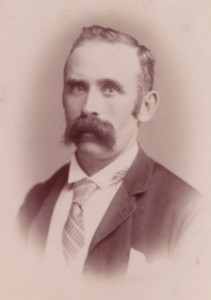 James MacBeith Finlay (1854-1910) was a Scottish-American explorer and amateur naturalist, linguist and ethnographer, who travelled extensively in the area of New Guinea and Timor in the late 19th and early 20th century.
James MacBeith Finlay (1854-1910) was a Scottish-American explorer and amateur naturalist, linguist and ethnographer, who travelled extensively in the area of New Guinea and Timor in the late 19th and early 20th century.
 James MacBeith Finlay (1854-1910) was a Scottish-American explorer and amateur naturalist, linguist and ethnographer, who travelled extensively in the area of New Guinea and Timor in the late 19th and early 20th century.
James MacBeith Finlay (1854-1910) was a Scottish-American explorer and amateur naturalist, linguist and ethnographer, who travelled extensively in the area of New Guinea and Timor in the late 19th and early 20th century.
At the age of 16, he undertook a voyage to America, the intention being to establish himself in the West as a cattle rancher, as his brother had achieved considerable success in that endeavour several years before. This ocean voyage would leave a deep and lasting effect on James, instilling in him a desire to spend more time aboard ship and see more of the world. Rather than travel to the American West, he spent much of his time around the docks of New York, hearing many stories about strange lands and peoples on the other side of the globe.
In 1872 he embarked on a long voyage, eventually reaching Timor, where he stayed for a time before sailing to the western coast of New Guinea (now Irian Jaya) which had barely been visited by Europeans, let alone explored.
After extensive contact and study of the coastal peoples, he arrived at Tanjong Narwaku (Cape D'Urville) and arranged for the first of three expeditions up the Mamberamo River, where he would meet the Ndake and Edoba people, who had never encountered a European before.
He recorded their reaction, noting that when they first saw him they ran into the forest, only to reappear the next morning, apparently to spy on him and see if he was dangerous to them, and whether he was a ghost or just a very strange human being. He decided the best course of action would be to just act normally, as if he wasn't being watched. After a couple of days, their curiosity got the best of them, and they sent an emissary to greet him. After looking him over and deciding he wasn't too much of a threat, more men began coming out of the forest, and soon he was surrounded by the Ndake, "with matted hair and practically stark naked, except for their many ornaments of bone and feather." He wrote in his journal, "On the whole, they seemed a pleasant, though timid lot (in their actions if not in their speech) and I felt at least as safe among them as among the officers and men of the Bernache."
Remarking that their language seemed totally unrelated to the speech he had heard in the coastal areas, he set about learning it, adding "It is indeed fortunate for me that the Ndake are exceedingly eager to teach me their language, becoming agitated and often arguing among themselves on the proper term for the most insignificant beetle or worm."
On the second expedition, he also encountered the Edoba, a neighboring tribe which had an ongoing rivalry with the Ndake, rarely bloody but often disruptive of tribal life. He noted that the two villages spoke practically the same language, and followed the same customs overall, the main exception being in their dealings with each other. "Above all, their sense of humor set both villages apart from most men I have had contact with, and Europeans would do well to borrow a share of it."
Later in his journals he expressed some worry that the Mamberamo people would be overwhelmed by contact with Europeans, noting that they were perhaps too keen on adopting the new goods and ideas that had begun to trickle in from the coast, and that he was in some way responsible for the ultimate fate of their way of life. He noted each new intrusion into their world, knowing that "the knife glints in their eyes and one mystery shrouds another."
In 1910, three months after he had left on his third expedition, word arrived on the coast that Ujazu Penake, the "White Man from the Sea" had died among the Ndake, and his bones had been hidden in the forest to prevent their use in magic.
Known papers by JMF:
Copied with permission of the author, E. Baine: Early Explorers of Australia and New Guinea
Photo courtesy O.E.P. (Sydney, AU)